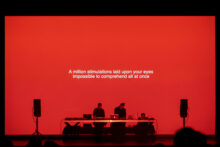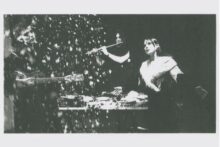The debut album is among the cultural artifacts that seize on the popular imagination with surprising force. In some rare cases, the form can attain mythical status among its audience. But what actually makes a first record successful? Rolling Stone suggests the best debuts give the sense of a band or artist arriving at the scene already fully formed, as if “ready to upend the game right at the very second”. With this as our metric, it is no surprise that new artists today – particularly those focused on attaining commercial success – are drawn to making albums that are bold, audacious, assertive, and self-assured.
Daughters marks the arrival of Jennifer Walton, an already beloved figure across various sectors of the alternative music underground, best known for her work with Sarah Midori Perry, Iceboy Violet, BABii and Gentle Stranger. These are artists working with vulnerable themes such as mental health, and their impact on Walton is unmistakable. In a stunning articulation of her world, Daughters new body of work reflects on grief, family, and psychological breakdown. However, in contrast to her previous collaborators, who express vulnerability through abrasive, industrial textures, Walton’s melancholia is amplified by woozy digital soundscapes and disjointed rock. Daughters is refreshing: it does not pretend to have the answers, nor aim to make any neat, simple revelations around genre, style, and, most crucially, subject matter.
This is perhaps unsurprising for an album about grief – the surreal and uncanny, yet at times strangely elusive, force that remains a constant presence throughout Walton’s music. The first seeds of Daughters were sewn while the artist was touring in North America with Kero Kero Bonitio seven years ago, when her father was dying of cancer. At various moments, the album recounts Walton’s experience of trying to process death in sterile locations such as airports, hotel rooms, and strip malls. The incomprehensibility of grief and its utterly disorienting effect is a recurring theme.
Daughters initially releases its aching through the track ‘Sometimes’. Here, the loss of another is treated as the same as the loss of self. Walton layers crushed, erratic compositions beneath tender, drowsy vocals: “Sometimes I forget my own name / Who I am, what I’m supposed to be”. ‘Sometimes’ opens with a strong pizzicato, strings plucked in simple rhythms, followed by crashing percussion and brass. As it progresses, the various instruments that have only just begun to form a band begin to unravel, sinking slowly into wilful chaos. The effect is a collapse of form, so that the hymn teeters on the edge of coherence. This wonderfully immersive medley of droning sounds makes for a stirring listen, transporting us into the mind of someone who is coming apart at the seams: Walton’s heart bleeds outside of her chest.
If the first track on the album is a dissociative response to shock, then what follows, ‘Born Again Backwards’, is a heightened, much sharper confrontation with reality – one that jolts the body into anxious attention. In this second song, Walton touches again on the ineffable nature of grief, this time through metaphor (“you’re pulled apart by two / Oversized horses”). In contrast to the lethargic energy that permeates ‘Sometimes’, though, these lines are accompanied by a score played presto: the pace of a wild animal running. With the rhythm of this charging as her background, the song’s protagonist appears caught in a frenzied, panicked state; an anxiety attack urging her to flee as the ground beneath begins to crumble: “Flailing / Wood to build a shelter … Never enough to / not die cold”.
Walton’s songwriting lays her grief bare throughout Daughters, but it is not until around halfway through the album that we get to hear its most naked translation. ‘Saints’ is perhaps one of the artist’s most intimate and moving songs, which is likely the result of its production. The track features the sounds of unattended machines inside a ward where the artist took her father for cancer research trials. “We sat, hunched and sick in the concourse,” Walton sings. Introducing the clinical hospital environment into the material of the music, the artist paints a vivid image of her experience over the past few years, bringing to life the very scene of her latent grief; the countless hours she spent waiting for an update from a nurse, or in her most hopeless moments, the figure of an angel: “I call on saints with all / of my ten fingers / in hope that they will hear me / and grant us more time”. The tragedy of Walton’s longing deepens toward the track’s climax, continuing her prayers in the present tense: “If you go I’ll wait right here for you / Standing on the corner where you used to live / I’ll wait right here for you”.
This more overt autobiographical approach – the compulsion to get everything private out – is the fuel that drives the album to its apex. ‘Miss America’, the sixth track, marks the point where Walton’s confessional songwriting expands outward, and her personal grief becomes a lens. The track was inspired by the day she found out about her father’s sickness while being held at an airport at the end of a thrilling tour – a childhood fantasy of hers. Upon her arrival home, she was also robbed, forcing her into the bureaucratic labyrinth of the American healthcare system just to replace stolen medication.
These events inform the surreal perspective of ‘Miss America’, which attempts to describe joy followed by devastation, ruin on the tail-end of (American) dreams: “Strip mall, drug deal, panic attacks / From my medicines co-pay / I’m Miss America for a day.” If Daughters is an album about learning to inhabit the world after a life-altering experience, then ‘Miss America’ points to a moment of conflict in that acclimatisation: loss reshapes more than our perception of self, it irreversibly changes how we view the world, too.
For the artist, the fugue state of grief is the ironic tool for bringing the fragmented American landscape, its broken dreams and fractured, deteriorating systems of care, into sharper focus (“And I knew you’d never believe / All the dreadful things I’d seen / From New York to LA / I’m Miss America for a day”). And it is this approach – how Walton remains perceptive while demonstrating powerful uncertainty and tenderness – that marks this debut album out as an extremely welcome entrance.






